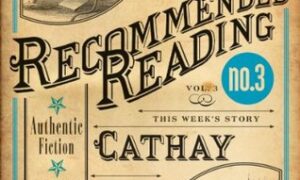 The Steady Running of the Hour by Justin Go
The Steady Running of the Hour by Justin Go
My rating: 3/5 cats



i feel like i may have missed something here.
this is not the kind of book i would ordinarily read, but i had heard such overwhelmingly good things about it, i requested it from the netgalley.
and there are a lot of things i enjoyed about this book, but at the same time, i can’t help feeling like i am missing a chunk of the story. i used to be such a good close reader; someone who remembered every little detail and didn’t need the answers telegraphed and actually enjoyed books like Infinite Jest, with their proud lack of resolution, leaving plenty of detail up to the reader. but with this one, i feel like a second reading is in order, or one that is less fragmented in terms of how much time i am able to devote to it in one reading session. at the same time, some of the fault has to lie with the book itself, because few people have enough time to read a nearly 500 page book in one gulp. and i don’t know for sure—maybe it is meant to be ambiguous, but i can’t help feeling that i missed some important connection along the way when i was reading it through my illness or my exhaustion. note to self—save the more detail-rich books for when you are in tip-top shape and read short stories before bed with your heavy heavy eyes.
it is still a very good book, despite my niggling sense of having sleepily dropped the ball somewhere along the way. it has a sort of magical fairy tale element to it: tristan is living in california when he receives a letter from a solicitor in london, from whom he learns that he may be the beneficiary of a sizable fortune if he can prove that he is the legitimate heir—the great-grandson—of an alpinist and WWI veteran named ashley walsingham and a woman named imogen soames-andersson. but he is not permitted to tell anyone about the potential fortune, and he will himself be responsible for providing the proof in less than two months time. the fortune (whose details cannot be revealed to him at this time) has remained unclaimed for 80 years, after walsingham died leaving it all to imogen, from whom he was separated at the time and who had apparently gone missing. if tristan is unable to prove his claim, the money will be distributed amongst various charitable organizations.
no problem, right? solve an 80-year-old missing persons case with no formal training or assistance, tell no one, and somehow find a letter, a birth announcement, a confession, from a woman who had vanished without a trace in any one of the many lovely cities of england, germany, france, or iceland. but the solicitor is rooting for him, and as tristan travels from city to city, burning through his savings, reporting his meager progress, making wrong turns and finding leads that go nowhere, he uncovers a ton of fascinating circumstantial evidence, but nothing solid. along the way, he meets many people who are coincidentally able to help him with his mission, and most importantly, he meets a woman in france named mireille, who begs him to give up his quest for answers and stay with her.
while his story is unfolding, we are also introduced to imogen and ashley; tristan’s possible great-grandparents; a couple who are allowed one brief week of young love together before ashley heads off into the war, despite imogen begging him to stay with her.
so we have two men, forced to choose between the possibility of love and happiness and their own sense of duty. tristan is a passionate student of history, and his search is less about the money (although that is of course a factor) and more about finding the truth, and ashley feels it is his responsibility to fight for his country, despite his deep new love for imogen.
the narratives weave together, and imogen and ashley’s story is terrific. i would have loved the book if it had just been their story. ashley’s experiences in the war are horrifying and very real, and imogen’s difficult decisions are heartbreaking. at one point in their time apart, she writes ashley’s name in the snow, and although that should be completely cheesy, it works—given the circumstances, it is completely lovely and fitting, and contributes to the whole theme of the reliance we have upon written documents to understand anything at all about the past. and of course, how those written documents so rarely tell the whole truth.
the book does all the things that drive me crazy in literature: the conversations left unsaid, the lies told out of not generosity, but something close, and all those things that make it really really hard for tristan to prove his claim. but it’s okay, because despite all the ominous warnings and cautions, and all the obstacles, somehow tristan is going to keep meeting kind people who will guide him to the next clue. which is completely unrealistic, but the fairy tale tone of the book was not a problem to me—but you gotta be willing to commit to the story that is being told without asking questions with your common-sense mind.
my major gripe is with mireille. her relationship with tristan, which is written as entirely platonic, but with possibilities, doesn’t wash with her asking him to give up his quest and stay with her. under the veil of the fairy-tale convention, implementing rules-of-archetype, it makes perfect sense, but most readers are going to see the request as ridiculous—why would someone give up the possibility of fortune or the answers to their family history for a stranger from whom no real promises have been extracted? and this relationship that seems to develop in their time apart was never convincing.
it’s true she gets some of the best lines:
Mireille says she believes that to be more interested in people because they lived long ago or because they suffered greatly is a mistake. She tells me that people still suffer greatly now, and that in any case one must not admire suffering or loss, because life is brief and time spent dwelling on things that have already passed is surely wasted. She says that even love can sometimes be a mistake, and that perhaps this vanished love of Ashley and Imogen’s had been a wasted one. She asks if a person could truly love someone they had not seen for so long, and for whom they had so little reason to harbor such wild affection.
–Pendant des années, she says. Pas la moindre raison.
Sometimes it’s hard to tell the difference between love and longing, Mireille says, but they are not at all the same thing, and while one is worth very much, the other is always wasted.
and this phrase, upon which the entire story seems to hinge, because of the circumstances of its later repetition (see, i can still close-read a little!):
The past or the future will never be there with you, she says. You’ll only ever have what you have right now. Not any more or any less.
Ni plus ni moins.
and i understand that the book is very much about choices, and about a willingness to let oneself be worn to the bone, to suffer and sacrifice to achieve a personal goal—the purity of giving and enduring until everything else has been pared away. as ashley muses when he is about to climb everest:
Accomplishing nothing save some indulgent acrobatics of the ego. Climbing a mountain just to say you’ve done it. Ashley strains to remember how it had been different in the early years, when he had loved simply to be among wild places, without the need to compete against them. Had the war changed this? That was too facile, for he had always loved to win, and yet this obsession with conquest seemed to have come after the war—not even conquest but only the prevention of failure, anything but a surrender to the superior forces that enveloped him.
It is a great mistake, Ashley knows. But if he does not go on—if he loses nerve or his courage falters—he will be unable to stand himself. He fears that most of all, more than death even.
and that is how tristan feels, although his stakes are decidedly lower than what ashley endured during his everest climb.
and it is a theme i appreciate, and i liked so much of this book (but mostly ashley and imogen) and i loved the hope and hopelessness and the bread crumb trail through history but then i got to the end and i was like, wait, what? seriously?
which may or may not have been my fault. read it, and then you tell me.
read my book reviews on goodreads







